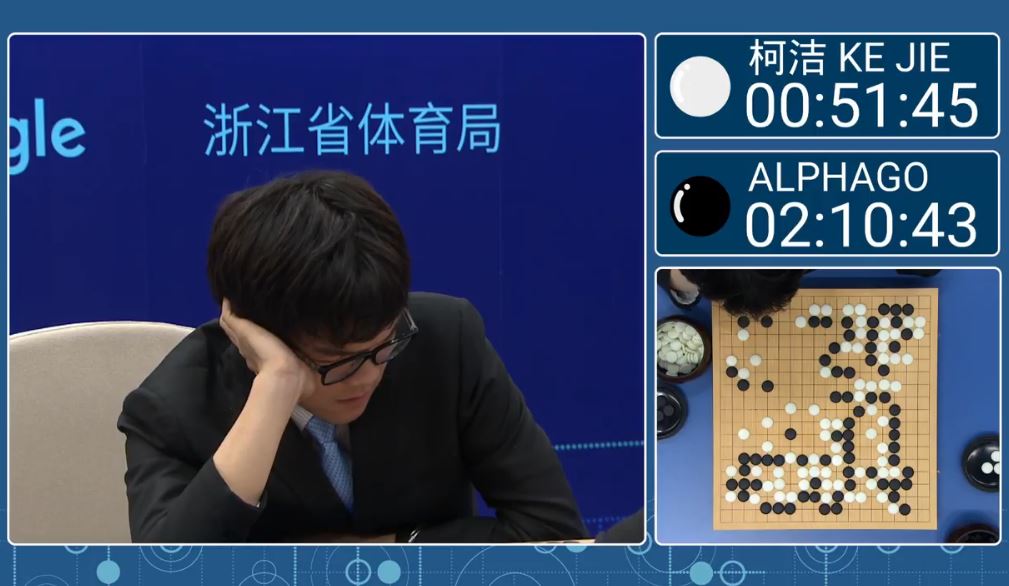Ke Jie ‘Pushed AlphaGo Right To The Limit’ In Second Match, Still Loses To AI
After a close second match. for the first 100 moves anyway, between Ke Jie and AlphaGo, the AI got the upper hand towards the end of the match and eventually defeated Ke Jie.
“Perfect Moves” From Ke Jie
In the first match between AlphaGo and Ke Jie, the AI scored a narrow win of only half a point against the world’s current best (human) Go player. However, AlphaGo seemed to only care about winning, and not necessarily winning by a large margin, which made it hard to deduce whether or not it was close to its game-playing limits.
Ke Jie said that in the second match, the AI played “opposite” of how he expected it to play to maximize its chance of winning, which means that AlphaGo changed its playing style from the first match.
Ke Jie was excited to play the game in the beginning and even thought that he may be able to win. The AI’s evaluation of Jie’s moves was also showing that the human Go player’s first 50 moves were “perfect.”
“For the first 100 moves it was the closest we’ve ever seen anyone play against the Master version of AlphaGo,” said DeepMind CEO Demis Hassabis in the post-game press conference.
However, around the middle of the game, AlphaGo started to gain an upper hand and Jie became nervous about his chances of winning. Eventually the AI forced the human player to resign.
AlphaGo Expert At Playing Against Itself
The updated version of AlphaGo was nicknamed “Master” by the DeepMind engineers late last year when they unleashed it online and allowed it to play 60 games against human players. AlphaGo proved to be unbeatable and went 60-0. Among those players was Ke Jie, who lost three times.
Get Tom's Hardware's best news and in-depth reviews, straight to your inbox.
AlphaGo “Master” learns mainly by playing against itself, which means that it has become an expert at finding its own weaknesses and then either eliminating those weaknesses or learning how to properly counteract when its match rivals try to exploit them.
Hassabis mentioned that even though the AI may already know all the moves it needs to make against itself to win, that’s not necessarily true when playing against human players. However, as we mentioned in a previous post, even though it should theoretically be possible for humans to “surprise” AlphaGo with certain moves, chances are slim that AlphaGo can still be surprised in a major way. The AI was able to watch millions of matches between professional players and play against itself thousands of times during the training of its neural networks.
Final Match To Watch
Even though AlphaGo has already won two out of three scheduled matches against Ke Jie, Ke Jie asked DeepMind’s CEO if he could play “white” (second to move) in the final match, to experiment some more aggressive tactics against AlphaGo. If Jie’s tactics are successful, this could make the final match the most interesting one to watch yet. The final match will be streamed on YouTube on Saturday (10:30-17:30, UTC+8).
This Friday, there will be two other matches: One is called "Pair Go" (8:30-12:30, UTC+8), in which two iterations of AlphaGo will assist human players who will play against each other, and the other is "Team Tournament" (12:30-17:30, UTC+8), in which AlphaGo will face a group of five players, all playing together to defeat the AI.
Updated, 5/25/2017, 9:05am PT: The article was corrected to say that "white" is the second to move, rather than first, in the Go game.
Lucian Armasu is a Contributing Writer for Tom's Hardware US. He covers software news and the issues surrounding privacy and security.
-
dkalen Correction: In Go black is the first to make a move, not white as it states in the article.Reply -
Jim90 It's a great shame when classic human challenges such as Go and Chess are greatly diminished due to computer programming/software opponents, irrespective of what level of "AI" we're talking about. Chess, for example, is becoming increasingly lost on each new generation.Reply -
Virtual_Singularity Was really hoping this Go champ would beat alphago by the second match. Now it's looking as if the human player wont be winning at all. I guess I'm one of the few who take no joy during this occasion. Thanks for the article all the same and congrats to DeepMind.Reply

